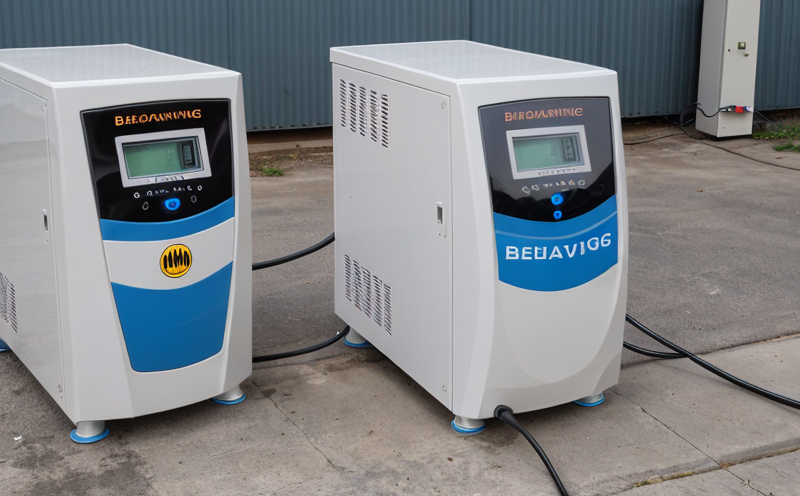EN 61982 Charging and Discharging Behavior Testing of Batteries for EV Applications
The European standard EN 61982 is a critical benchmark in the validation process for batteries intended for electric vehicle (EV) applications. This standard provides detailed guidelines on how to test charging and discharging behavior, which are essential aspects that impact the performance, safety, and longevity of EV batteries.
Understanding the parameters involved in this testing is vital for ensuring compliance with international standards. The test protocols outlined in EN 61982 aim to simulate real-world conditions under which batteries will be used, thereby providing a reliable assessment of their capabilities. This includes temperature cycling tests that mimic varying environmental temperatures during charging and discharging processes.
Another key aspect is the deep discharge testing, where the battery is fully discharged multiple times using defined current levels to ensure it can recover its capacity after repeated cycles. Additionally, overcharge and overdischarge conditions are tested to evaluate safety margins and prevent potential hazards. These tests go beyond basic functionality checks by addressing critical factors like thermal stability, electrical efficiency, and mechanical integrity.
The importance of these tests cannot be overstated in the context of electric vehicle development. They not only help manufacturers meet regulatory requirements but also ensure that end-users receive reliable products with extended lifespans. By adhering to EN 61982, companies can demonstrate their commitment to quality and safety standards recognized globally.
Furthermore, this testing ensures compliance with other relevant international standards such as ISO/IEC 80079-34 for flammable gas emissions during overcharge conditions. The detailed nature of EN 61982 allows it to be a comprehensive guidebook that supports the entire lifecycle of EV battery development from initial design through final product release.
Compliance with these rigorous standards enhances market confidence, fostering trust among consumers about the reliability and safety of electric vehicles. It also opens doors for international trade by meeting global regulatory requirements across different countries. This standard is particularly important in sectors like automotive manufacturing where battery performance plays a crucial role in vehicle efficiency and overall user experience.
Why It Matters
The significance of EN 61982 lies in its ability to provide a standardized method for evaluating the charging and discharging behavior of batteries used in electric vehicles. This standard is crucial because it helps ensure that these batteries meet stringent performance criteria, contributing significantly to the safety and reliability of EVs.
One primary reason why this testing matters is the direct impact on vehicle efficiency and range. By accurately simulating real-world conditions during charging and discharging processes, EN 61982 helps identify any inefficiencies or potential issues early in the development stage. This allows manufacturers to address these challenges before the product reaches the market.
Another critical aspect is safety compliance. The standard includes specific tests designed to evaluate how batteries handle overcharge and overdischarge conditions, ensuring that they do not pose risks such as overheating or fire hazards. These safety features are paramount in EV design, where battery management systems play a vital role.
Moreover, the results of EN 61982 testing contribute to overall vehicle performance optimization. By understanding how batteries behave under various charging and discharging scenarios, engineers can fine-tune their designs for better energy retention and faster recovery times after deep discharge cycles.
The importance of this standard extends beyond just individual vehicles; it also influences broader industry trends towards more sustainable transportation solutions. Meeting these standards demonstrates a company's dedication to producing high-quality products that meet global expectations regarding safety, performance, and environmental responsibility.
Benefits
- Enhanced Safety: By simulating real-world conditions, EN 61982 ensures that batteries can safely handle overcharge and overdischarge scenarios without compromising safety.
- Better Performance: Realistic testing helps identify inefficiencies early in the development process, allowing for improvements that enhance overall battery performance.
- Regulatory Compliance: Meeting these standards ensures compliance with international regulations and opens up opportunities for global markets.
- Informed Decision-Making: Detailed test results provide valuable insights into the behavior of batteries under various conditions, supporting informed decisions in both R&D and manufacturing processes.
International Acceptance and Recognition
The widespread adoption of EN 61982 underscores its importance within the global automotive industry. This standard is recognized not only in Europe but also around the world due to its comprehensive approach to evaluating battery performance.
Automakers like Tesla, Nissan, and BMW have embraced these standards as part of their quality assurance protocols for electric vehicles. By adhering to EN 61982, they ensure that their products meet high safety and reliability benchmarks across diverse operational environments.
The use of this standard also fosters collaboration between manufacturers and regulatory bodies worldwide. It facilitates smoother international trade by aligning with common performance criteria recognized globally. This harmonization is particularly beneficial for companies operating in multiple regions, as it reduces the need for separate compliance processes in different countries.
Moreover, EN 61982 serves as a benchmark that encourages continuous improvement within the industry. As technologies evolve and new challenges arise, the standard provides a framework for addressing these issues through ongoing research and development efforts supported by rigorous testing protocols.
In conclusion, the international acceptance and recognition of EN 61982 highlight its role in advancing the field of electric vehicle technology. Its comprehensive nature ensures that batteries used in EVs not only meet current standards but also set a foundation for future advancements in this rapidly growing sector.





